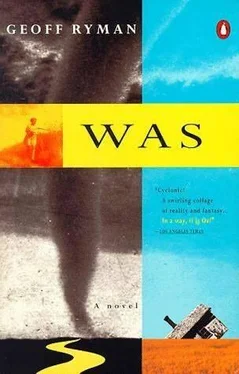They filmed the last scene first.
"Hey," said the director, a beefy, forty-year-old ex-cameraman. "You know, that's really good." He was surprised. They were on to something.
MEET MORT, said the billboards. HE LOVES KIDS. TO PIECES.
The Child Minder was a monstrous success. For some reason, young teenagers were willing to pay to see people their own age tortured and killed in various ways. Market research showed that many of them went to see The Child Minder two or three times.
Ira never went to see it at all. "I just think it's a terrible shame that the only thing this society can find to do with your talent is that garbage."
Jonathan disagreed. There was something to Mort, something he couldn't define. Mort meant something.
There was a sequel. Mort had died at the end of the first film. Child Minder II resurrected him in a studio-bound hell.
Hell was full of the souls of children. They were made to sing merry school songs, chained to desks. They were drilled by tormenting demons in gray clothes with spectacles and fangs and rulers that beat wrists until hands dropped off.
There was a race of dwarves in Hell. They wore black leather harnesses, just like in certain L.A. bars. They had interesting deformities that took the better part of a day to create in makeup, and they flayed people alive. They sang and danced as they worked, like a Disney movie played backward. At the climax, Hell was harrowed by a visiting priest, and Mortimer escaped in a blaze of fire, out into the real world, an eternal spirit, to kill again and again in a chain of sequels. Mort was the wounded spirit of the eternal hatred of children.
In each of the films, all of the adults were either fools or drunks, wrapped up in work or sleazy sex. They had failed their children utterly. The children were left to defend themselves.
Mort materialized out of their parents. In sequences of special effects, he slimed his way out of parents' sleeping, snoring mouths. Mortimer was wept out of their eyes, to coagulate on the floor. He climbed out of the television set as adults watched the news impassively. The news, in the form of armed alerts, terrorism and serial murders, continued to flicker on Mortimer's face. The children died, slowly, horribly.
Market research showed that there had to be a murder every ten minutes or the audience got bored. In each ending, virtue triumphed in a blaze of light, and another generation would be left to grow up in peace. Except that as each sequel ended, Mort's face would be glimpsed, reflected in a pair of adult sunglasses or waiting for a bus, reading a newspaper. CHILD MURDERED, the headline would scream. With each return, Mortimer made more money.
Jonathan started to get letters. Many of them were from boys, wanting to know about the makeup and the special effects. Some of the letters were from girls who wanted to know about his emotional life. Was he as lonely as he seemed in the movie? Did he have someone to love him? One letter was from a woman who claimed to be a vampire. Was he one himself? Did he want to become one?
Jonathan became a star interview, in a certain kind of magazine.
In full color, the magazines showed how rubber bodies were made so that the skin and flesh could be pulled off in realistic detail as the arms writhed, as the arteries pumped out jets of blood. There were faces of women, with tiny pig eyes and huge mouths the size of footballs full of teeth. The center-page spread would be of Jonathan as Mort, his face in healed sections.
Jonathan endeared himself to the market by showing in the interviews that he had once been a fan of horror movies himself. He would lapse into lines of Bela Lugosi's dialogue. He would pay tribute to the grand old Gothic tradition. He might allow himself a touch of yearning for a time when fear was achieved through suggestion rather than bloody detail. He tried to explore what he thought he saw in the character of Mort. The audience found all of this flattering.
Jonathan was invited as Guest of Honor to something called a Con. It was a convention for fans of what was described as dark fantasy. Darkcon it was called.
Darkcon was held in Baltimore. Jonathan had never seen Baltimore. He spent three days in the city and still didn't see it. He saw the inside of the convention hotel instead.
It was a large, modern facility, with polished corridors and carpets and polite young women in orange jackets wearing name-tags. They smiled behind desks. The smiles grew uneasy as men in long hair, beards and black T-shirts began to take over the hotel.
Jonathan was welcomed by the Con committee and given a pack of publications-program books, more magazines. A plump, fresh-faced young man called Karl had been assigned to him. Karl was in charge of Guest Relations. He took Jonathan on a tour.
The Con had a bookroom, full of paperbacks in black jackets. Just inside the entrance there was a row of realistic, severed heads, caked in blood. Outside the bookroom, a little child was screaming, being pulled inside by her mother. Behind the severed heads, the book dealers were chuckling.
The Con had an art show. Its largest piece consisted of five realistically re-created nude corpses, hanging from hooks over a fan of rusted, bloodstained buzz saws.
Jonathan stood before it, with an expression of rapt and dazzled wonder.
"Toto," he said, in a little girl's voice. "We must be over the rainbow!"
As a Canadian, Jonathan seemed to spend half his life signaling Americans that he had told them a joke. He wiggled his eyebrows and leered at Karl. Karl suddenly grinned and covered one eye with a hand. "Oh, I get it!" he said. Karl's skin was brown, but his cheeks were very pink and his thick eyebrows almost met. Jonathan found himself feeling tender toward him.
A tall, thin woman approached them, all angles. Her hair flew everywhere, and her eyes were bright, and she was the same age as Jonathan. He placed her perhaps a bit too quickly. An ex-hippie, he judged, one of his own kind, a kindred spirit.
"I did the metalwork," she announced, pointing to the buzz saws.
"I'm… impressed," said Jonathan, choosing his words carefully. "You've put a lot of effort into it." Looking again, he had to admit that the metalwork was beautifully done. He suddenly saw the woman in his mind, slim in overalls, with a blowtorch.
"This is Moonflower," said Karl, coughing, shuffling. "She's famous," he added. "She does my fanzine."
"How… This is a strange question. You're obviously talented."
"I usually draw elves," Moonflower said. "And seagulls and stars. Stuff like that."
"Right. So where do the corpses fit in?"
"You're asking me that?" Moonflower seemed surprised. "The elves and this. They're the flip side of the same thing."
Karl and Jonathan had lunch together in the Con buffet. Eye of Newt was on the menu. Karl was obviously starstruck by Jonathan. Jonathan found this charming. To please Karl, Jonathan found himself becoming Mortimer.
"So charming to have lunch with you," he said in Mortimer's voice. "Are you often on the menu?"
"Uh-oh," said Karl, in something not unlike real fear.
"Joke," cooed Mortimer and batted his eyelashes. "People do say my humor slays them."
Mort was a pastiche of different acting styles. Mostly he spoke like a slightly camped-up Boris Karloff.
"Yup, really kills me," said Karl, wincing with anticipation.
"Is that an invitation?" said Mort.
"Ew!" said Karl in delicious discomfort. "Ew! He's doing it! He's doing it!"
The fans didn't know Jonathan's face, but they recognized the voice. They looked up from the tables. They put down their trays and began to gather around.
Jonathan played with Karl's hair. Karl stood, eyes closed, bearing up like a child determined to resist a tickling.
Читать дальше












